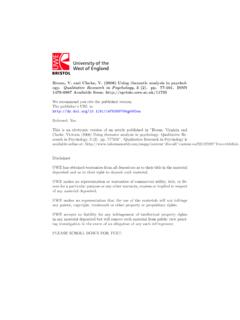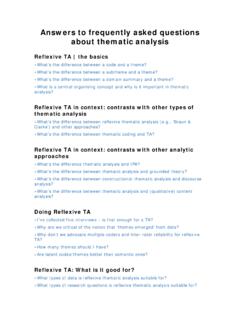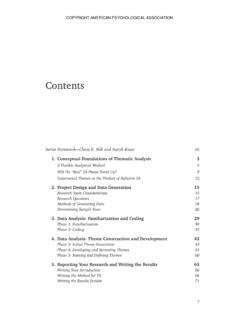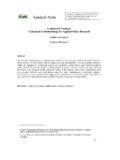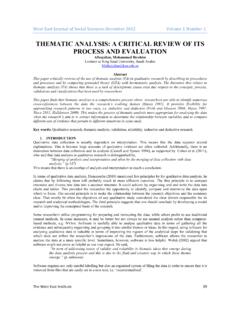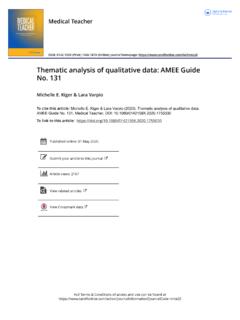Transcription of Braun, V. and Clarke, V. (2006) Using thematic analysis in ...
1 Braun, V. and Clarke, V. (2006) Using thematic analysis in Research in Psychology, 3 (2). pp. 77-101. ISSN1478-0887 Available from: recommend you cite the published publisher s URL is: : YesThis is an electronic version of an article published in Braun, Virginia andClarke, Victoria (2006) Using thematic analysis in psychology. Qualitative Re-search in Psychology, 3 (2). pp. 77?101 . Qualitative Research in Psychology isavailable online at: ~db=all~content=a795127197~frm= has obtained warranties from all depositors as to their title in the materialdeposited and as to their right to deposit such makes no representation or warranties of commercial utility, title, or fit-ness for a particular purpose or any other warranty, expressor implied in respectof any material makes no representation that the use of the materials will not infringeany patent, copyright, trademark or other property or proprietary accepts no liability for any infringement of intellectual property rightsin any material deposited but will remove such material frompublic view pend-ing investigation in the event of an allegation of any such SCROLL DOWN FOR TEXT.
2 Using thematic analysis in psychology Virginia Braun * & Victoria Clarke Department of Psychology Faculty of Applied Sciences The University of Auckland The University of the West of England Private Bag 92019 Frenchay Campus Auckland Bristol New Zealand BS16 1QY Ph: +64 9 3737599 x 87561 +44 117 3282176 Fax: +64 9 3737450 +44 117 3282904 MS Word Length (incl. references, notes, tables and figures): 13510 2 Using thematic analysis in psychology thematic analysis is a poorly demarcated, rarely-acknowledged, yet widely-used qualitative analytic method within psychology. In this paper, we argue that it offers an accessible and theoretically-flexible approach to analysing qualitative data. We outline what thematic analysis is, locating it in relation to other qualitative analytic methods that search for themes or patterns, and in relation to different epistemological and ontological positions.
3 We then provide clear guidelines to those wanting to start thematic analysis , or conduct it in a more deliberate and rigorous way, and consider potential pitfalls in conducting thematic analysis . Finally, we outline the disadvantages and advantages of thematic analysis . We conclude by advocating thematic analysis as a useful and flexible method for qualitative research in and beyond psychology. Keywords: thematic analysis , qualitative psychology, patterns, epistemology, flexibility 3 Author Biographical Notes Virginia Braun is a senior lecturer in the Department of Psychology at The University of Auckland, where she teaches, supervises and conducts qualitative research. Her research interests are primarily focused around women s health, gendered bodies, and sex and sexuality, and the intersections between these areas.
4 She is currently working on projects related to 'sex in long-term relationships', 'female genital cosmetic surgery', and the social context of STI transmission . Victoria Clarke is a senior lecture in social psychology at the University of the West of England. She has published a number of papers on lesbian and gay parenting, and co-edited two special issues of Feminism & Psychology on Marriage (with Sara-Jane Finlay & Sue Wilkinson). She is currently conducting ESRC-funded research on same sex relationships (with Carol Burgoyne & Maree Burns) and co-editing (with Elizabeth Peel) a book LGBT psychology (Out in Psychology, Wiley). 4 Using thematic analysis in psychology thematic analysis is a poorly demarcated and rarely-acknowledged, yet widely-used qualitative analytic method (see Boyatzis, 1998; Roulston, 2001) within and beyond psychology.
5 In this paper, we aim to fill what we, as researchers and teachers in qualitative psychology, have experienced as a current gap: the absence of a paper which adequately outlines the theory, application, and evaluation of thematic analysis , and one which does so in a way accessible to students and those not particularly familiar with qualitative That is, we aim to write a paper which will be useful as both a teaching and research tool in qualitative psychology. Therefore, in this paper we discuss theory and method for thematic analysis , and clarify the similarities and differences between different approaches that share features in common with a thematic approach. Qualitative approaches are incredibly diverse, complex and nuanced (Holloway & Todres, 2003), and thematic analysis should be seen as a foundational method for qualitative analysis .
6 It is the first qualitative method of analysis that researchers should learn, as it provides core skills that will be useful for conducting many other forms of qualitative analysis . Indeed, Holloway and Todres (2003: 347) identify thematizing meanings as one of a few shared generic skills across qualitative For this reason, Boyatzis (1998) characterises it not as a specific method but as a tool to use across different methods. Similarly, Ryan and Bernard (2000) locate thematic coding as a process performed within major analytic traditions (such as grounded theory), rather than a specific approach in its own right. We argue thematic analysis should be considered a method in its own right. One of the benefits of thematic analysis is its flexibility.
7 Qualitative analytic methods can be roughly divided into two camps. Within the first, there are those tied to, or stemming from, a particular theoretical or epistemological position. For some of these - such as conversation analysis ([CA] , Hutchby & Wooffitt, 1998) and interpretative phenomenological analysis ([IPA] , Smith & Osborn, 2003) there is (as yet) relatively limited variability in how the method is applied, within that framework. In essence, one recipe guides analysis . For others of these such as grounded theory ( , Glaser, 1992; Strauss & Corbin, 1998), discourse analysis ([DA] , Burman & Parker, 1993; Potter & Wetherell, 1987; Willig, 2003) or narrative analysis ( , Murray, 2003; Riessman, 1993) there are different manifestations of the method, from within the broad 5 theoretical framework.
8 Second, there are methods that are essentially independent of theory and epistemology, and can be applied across a range of theoretical and epistemological approaches. Although often (implicitly) framed as a realist/experiential method ( , Aronson, 1994; Roulston, 2001), thematic analysis is actually firmly in the second camp, and is compatible with both essentialist and constructionist paradigms within psychology (we discuss this later). Through its theoretical freedom, thematic analysis provides a flexible and useful research tool, which can potentially provide a rich and detailed, yet complex account of data. Given the advantages of the flexibility of thematic analysis , it is important that we are clear that we are not trying to limit this flexibility.
9 However, an absence of clear and concise guidelines around thematic analysis means that the anything goes critique of qualitative research (Antaki, Billig, Edwards, & Potter, 2002) may well apply in some instances. With this paper, we hope to strike a balance between demarcating thematic analysis clearly , explaining what it is, and how you do it - and ensuring flexibility in relation to how it is used, so that it does not become limited and constrained, and lose one of its key advantages. Indeed, a clear demarcation of this method will be useful to ensure that those who use thematic analysis can make active choices about the particular form of analysis they are engaged in. Therefore, this paper seeks to celebrate the flexibility of the method, and provide a vocabulary and recipe for people to start doing thematic analysis in a way that is theoretically and methodologically As we will show, what is important is that as well as applying a method to data, researchers make their (epistemological and other) assumptions explicit (Holloway & Todres, 2003).
10 Qualitative psychologists need to be clear about what they are doing and why, and include the often-omitted how they did their analysis in their reports (Attride-Stirling, 2001). In this paper we outline: what thematic analysis is; a 6-phase guide to doing thematic analysis ; potential pitfalls to avoid when doing thematic analysis ; what makes good thematic analysis ; and advantages and disadvantages of thematic analysis . Throughout, we provide examples from the research literature, and our own research. By providing examples we show the types of research questions and topics that thematic analysis can be used to study. Before we begin, we need to define a few of the terms used throughout the paper. Data corpus refers to all data collected for a particular research project, while data set refers to all the data 6 from the corpus that is being used for a particular analysis .
